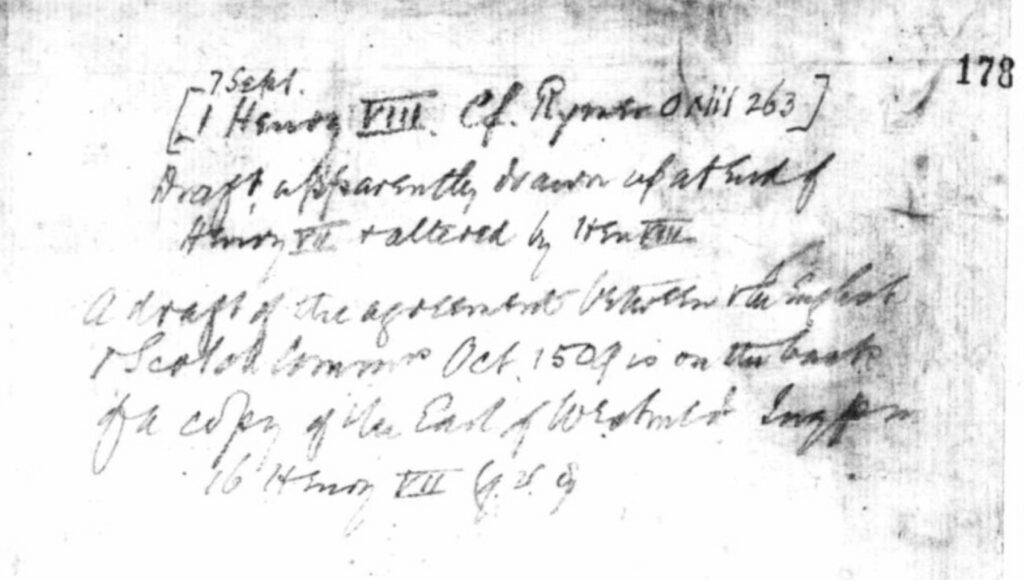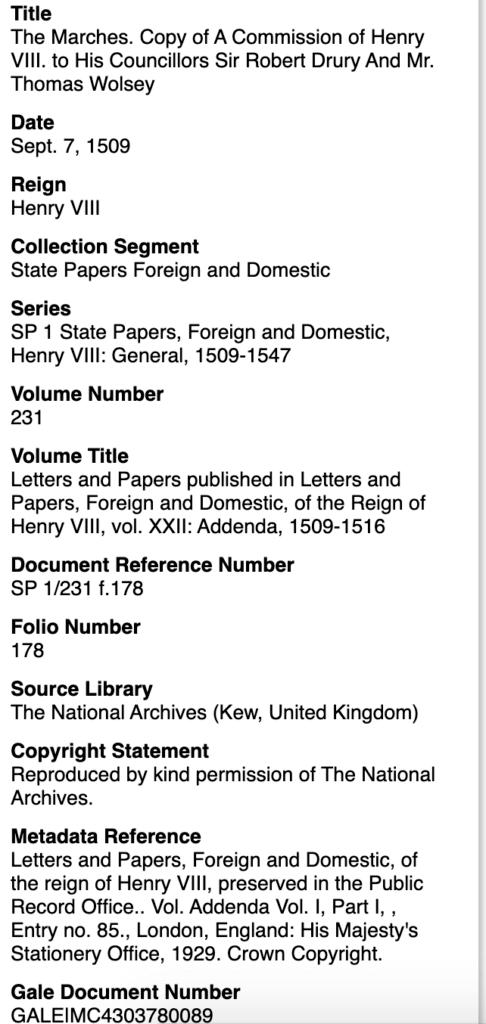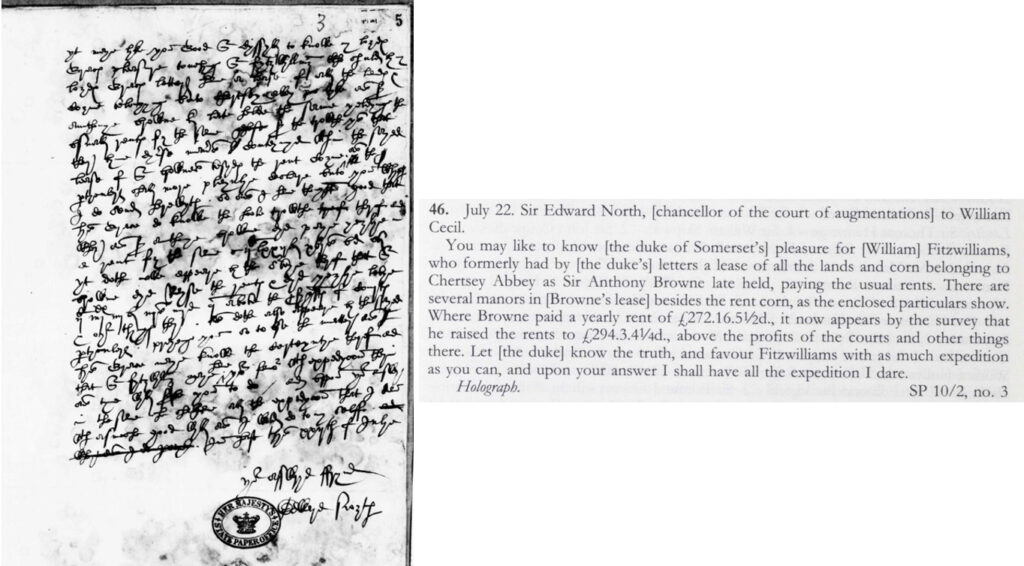│By Ellie Brosnan, Gale Ambassador at Durham University│
State Papers Online is a digitised collection containing British government papers from throughout the sixteenth, seventeenth and eighteenth centuries. It offers access to a range of different materials, from official documentation and legislation to more informal correspondence between key political actors of this period. This resource is split into three main collections that all host different materials related to the issue of early modern British government. The focus of this blog post is exploring how State Papers Online can be utilised for an undergraduate dissertation investigating the changes to early modern politics over the course of these centuries.
Primary sources reveal the systems and structures of Tudor government
State Papers Online offers a particularly rich and detailed insight into both Tudor and Stuart government, through the papers of officials from these centuries. A notable development in this period that is evident from the resources contained within State Papers Online, is the growth of the position and power of ministers and councillors, as certain figures come to dominate much of the papers contained within these collections for specific decades. Thus the archive gives students insight into the various workings of government and administration through the papers of these different figures, as will be highlighted by an exploration of the source below.

This source is a commission drafted by Henry VIII, copied for his councillors Sir Robert Drury and Cardinal Wolsey to address the disturbances in the Middle Marches upon Henry’s ascension to the throne. Different drafts of government legislation found in State Papers Online help indicate the shifts and political developments of the early modern era, as such materials show the increasing sophistication of the state under the Tudors, with an early form of bureaucracy emerging. Equally, the recurrence of figures such as Wolsey throughout these different materials shows the growth in the role and importance of government ministers during the early modern period. Indeed, students and researchers can infer and deduce a significant amount about early modern government through the systems and structures revealed by these sources – beyond the content directly discussed within them.
Support for students in contextualising medieval and early modern sources
What is particularly useful about Gale’s State Papers Online archive is that it does not just offer digitised copies of materials that would otherwise be largely inaccessible to students – it provides many additional features which can help students contextualise the source, offering further insight for different areas to research. For example, each of the sources within this collection comes with a full citation and metadata reference. Features like this greatly increase both the accessibility and usability of the source materials, making them much easier for undergraduate students to use in their dissertations. The screenshot below shows the full citation for the source above, revealing additional details about the source that would be useful for student research.

(The Marches. Copy of A Commission of Henry VIII. to His Councillors Sir Robert Drury And Mr. Thomas Wolsey. 7 Sept. 1509)
State Papers Online Calendars
Another feature State Papers Online offers that is useful to highlight for similar reasons is how each source is connected with its Calendar record. The Calendar of State Papers is a resource used by historians of the Tudor and Stuart period which acts as a register of documents relating to early modern British government, and summarises these texts. The Calendar of State Papers offers students a much more accessible way to read and engage with such texts, as seen by the screenshots below which compare the two versions (original manuscript and calendar record) of a text written by Sir Edward North, the Chancellor of the Court of Augmentations under Edward VI, to William Cecil, another adviser under the Edwardian regime. State Papers Online now contains the digitised versions of the actual Calendar documents, showing how they truly appear in the physical archive.

Right: Knighton, C. S., editor. Calendar of State Papers, Domestic Series, of the reign of Edward VI, 1547-1553, preserved in the Public Record Office. Revised Edition, edited by C. S. Knighton. Her Majesty’s Stationery Office, London, 1992. State Papers Online, https://link.gale.com/apps/doc/MC4300100001/SPOL?u=duruni&sid=bookmark-SPOL&xid=2377b94e&pg=51 (Please note, these links will work from August 1, 2022.)
The Calendar of State Papers helps students work more independently
The way many of the medieval and early modern texts have been transcribed in this way makes them far easier for students like me to use than attempting to read the original manuscripts from the early modern period directly, which can often be illegible for those with limited experience in doing so. Engaging with contemporary material as an undergraduate was one of the more daunting aspects of my degree and, in my own experience, often caused the most concern amongst myself and my peers. State Papers Online not only brings together thousands of materials in one searchable database, it also offers brief context to each of those resources contained. Such supporting features are particularly useful for those writing undergraduate dissertations as the nature of the dissertation demands that students work much more independently than when completing assignments in earlier years of their degree.
A valuable resource for the study of early modern British government
State Papers Online is a particularly useful resource for research given the extensive materials offered in the collection, with thousands of papers from across the sixteenth, seventeenth and eighteenth centuries – all in one database! The range of content contained within these collections could be used for any form of dissertation pertaining to early modern politics, whether it be an examination of formal and institutional mechanics or the more informal political negotiations that took place during these years. The comprehensive coverage offered by this resource, as well as the additional features discussed here that aid contextualisation of such sources, illustrate its value to any student studying early modern British government.
If you’re interested in State Papers Online, you might like:
- New State Papers Online Experience Available to Preview
- The Wacky World of Early Modern Patents
- The Mystery of the Jacobite Poet
- Collection Highlights – State Papers Online Eighteenth Century, Part IV: Scandinavia, Eastern Europe and Turkey
If you want to read more about using primary sources in a dissertation, try:
- How Gale Primary Sources Helped Me with My Dissertation – and Can Help You Too!
- A Conversation With Master’s Student Bokhutlo Tlhabanelo on Her Use of Gale Primary Sources
- How Gale’s Archives Supported My Thesis on the Politics of Contraception in South Africa, 1970s–80s
- Moving from Undergraduate to Postgraduate Study: Using Digital Archives More Proficiently
- My Top 10 Tips to Ace Your Dissertation
Blog post cover image citation: A design created using a screenshot of the new State Papers Online search bar, as seen on the new platform, combined with a primary source from the archive.


